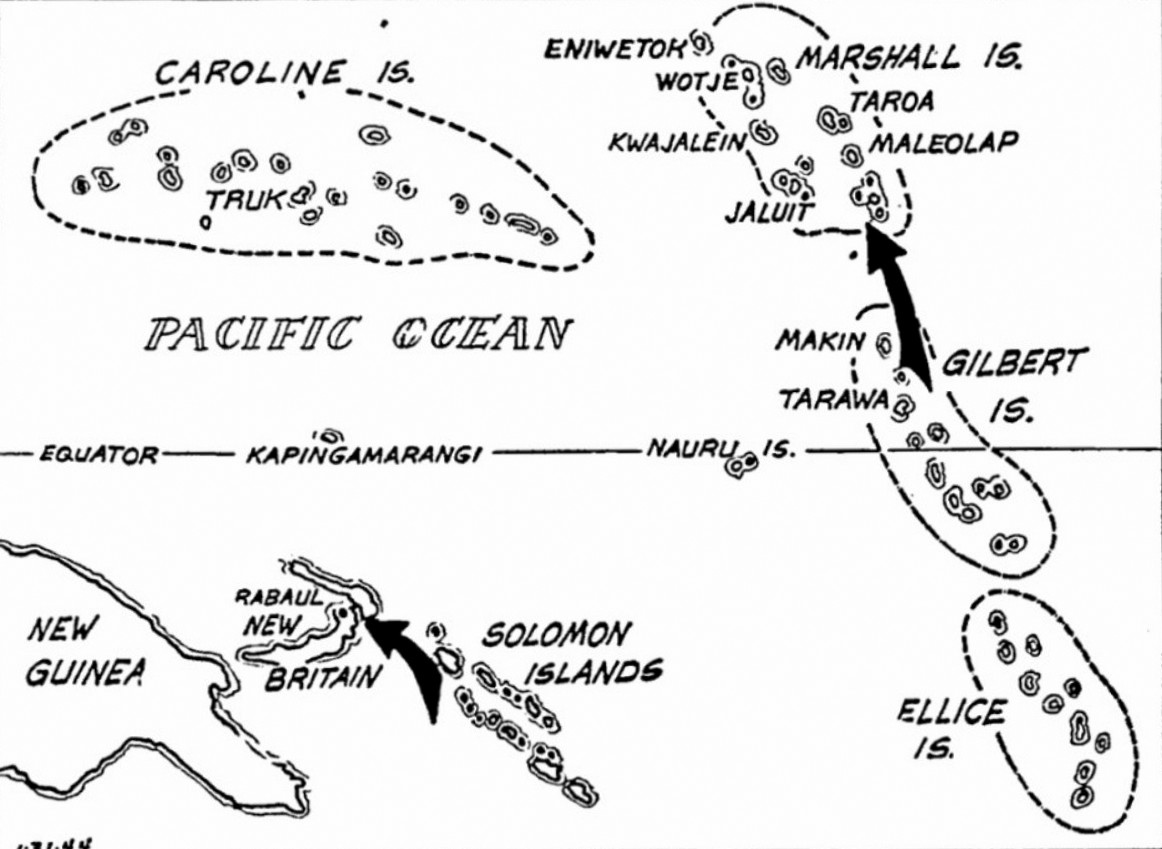U.S. Navy Department (January 31, 1944)
Communiqué No. 500
Pacific and Far East.
U.S. submarines have reported the sinking of fourteen enemy vessels in operations against the enemy in these areas, as follows:
SUNK:
- 2 large transports
- 1 medium transport
- 1 medium tanker
- 1 medium naval auxiliary
- 1 small freighter
- 1 medium cargo transport
- 7 medium freighters
These actions have not been announced in any previous Navy Department Communiqué.
CINCPAC Communiqué No. 26
Our carrier task forces today continued their attacks on Kwajalein, Roi, Maloelap and Wotje.
During the day surface forces bombarded the same objectives while carriers extended their operations to include bombing of Eniwetok.
CINCPAC Press Release No. 244
For Immediate Release
January 31, 1944
During the night of January 28 and 29 (West Longitude Date) Liberators and Mitchells of the 7th Army Air Force and search Liberators and Mariners of Fleet Air Wing Two carried out operations against Wotje, Kwajalein, Jaluit, and Maloelap Atolls.
Army heavy bombers dropped more than 27 tons on Wotje, a total of 17 tons on Roi and Kwajalein Islands and 3 tons on Jaluit.
No fighter or anti-aircraft opposition was encountered.
A Navy Mariner Patrol Plane bombed Taroa during the night without opposition. A flight of Navy search planes over Taroa in the afternoon of January 28 was attacked by nearly a dozen fighters of which at least two were shot down and three others damaged. We suffered no losses.
Army medium bombers attacking Taroa the same afternoon bombed airdrome and cantonment structures, damaged 11 planes on the ground and set fire to a small craft. Six fighters attacked our planes and one fighter was damaged. Our losses were light.
CINCPAC Press Release No. 245
For Immediate Release
January 31, 1944
Aircraft of the 7th Army Air Force and search planes of Fleet Air Wing Two made attacks on principal Marshall Island bases during the night of January 29‑30 (West Longitude Dates). These raids were coordinated with the attacks of carrier‑based squadrons of the past two days.
In the evening of January 29, Army Mitchell bombers struck shore installations and small craft at Maloelap and Wotje, while Army Dauntless dive bombers and Warhawk fighters struck Imieji Island in the Jaluit Atoll. No enemy fighters were encountered, and anti-aircraft was ineffectual.
During the night Army Liberators dropped 45 tons of bombs on Kwajalein Atoll, and nearly 10 tons on Wotje. Liberators and Navy Catalina and Ventura search planes struck Mille and Taroa with a total of 21 tons of bombs, and a single Liberator hit Jaluit with an additional three tons.
CINCPAC Press Release No. 246
For Immediate Release
January 31, 1944
Two squadrons of Coronado seaplanes of Fleet Air Wing Two made a strong attack on Wake Island during the night of January 30‑31 (West Longitude Date). All bombs hit in or near the target area and no planes were lost.


